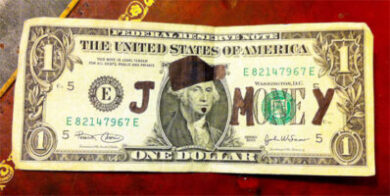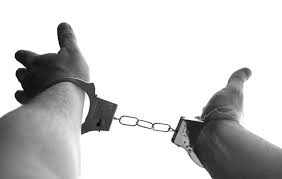The image that comes to mind of a dollar bill is a crisp paper bills or bundles of new bank bills. However, we often receive dollar bills with writings or drawings etched to the currency. Sometimes, out of emergency, people write on the edges of the dollar bill.
Generally, defacing the dollar bill can earn you up to six months imprisonment upon conviction and/or an unspecified fine. Thus, one has to be careful in handling the dollar bills. The question we often ask are: Is it illegal to draw or write on money? What do we do with defaced money?
Defacing meaning:
The Merriam Webster Dictionary defined defacing as “to spoil the surface or appearance of something by drawing or writing on it.
Defacement of currency in such manner that it is made unfit for circulation comes under the jurisdiction of the United States Secret Service.
Ripped money:
Ripped money will mean any money that is unfit for further circulation, that is an unfit currency. The Federal Reserve System is responsible for placing paper bills into circulation and removing unfit ones from circulation. The definition of unfit currency, from the Federal Reserve System, is a “note that is not suitable for further circulation because of its physical condition” due to being:
- torn
- worn
- limp
- dirty
- defaced
What to do with ripped money?
The U.S. Federal Reserve guidelines for banks directs them to accept “torn, dirty, limp, worn, or defaced” bills. As per the fact that people are being advised to take good care of the currency, ripped money will still be collected by the bank.
However, if in doubt, try exchanging a worn note at your neighborhood commercial bank. A commercial bank may then include the note in its deposit to the Federal Reserve if more than half of the original note is visibly present and no special investigation is required to ascertain the note’s worth.
Is it illegal to draw or write on money:
The Case laws:
For instance, in the case between Smith v. Gougen 415 U.S. 566, 595–96, 94 S. Ct. 1242, 1258 (1974), the United States Supreme Court had this to say:
A number of examples can be found of statutes enacted by Congress which protect only a peculiarly governmental interest in property otherwise privately owned. Title 18 U.S.C. § 504 prohibits the printing or publishing in actual size or actual color of any United States postage or revenue stamp, or of any obligation or security of the United States. It likewise prohibits the importation of any plates for the purpose of such printing. Title 18 U.S.C § 331 prohibits the alteration of any Federal Reserve note or national bank note, and 18 U.S.C. § 333 prohibits the disfiguring or defacing of any national bank note or coin. Title 18 U.S.C. § 702 prohibits the wearing of a military uniform, any part of such uniform, or anything similar to a military uniform or part thereof without proper authorization. Title 18 U.S.C. s 704 prohibits the unauthorized wearing of service medals. It is not without significance that many of these statutes, though long on the books, have never been judicially construed or even challenge
The Statutes:
Defacement of currency is a violation of Title 18, Section 333 of the United States Code. Generally, under this provision, definition of currency defacement is the following;
Whoever mutilates, cuts, disfigures, perforates, unites or cements together, or does any other thing to any bank bill, draft, note, or other evidence of debt issued by any national banking association, Federal Reserve Bank, or Federal Reserve System, with intent to render such item(s) unfit to be reissued, shall be fined under this title or imprisoned not more than six months, or both.
Regarding using money to advertise a business, the law states: For instance, “[W]hoever . . . writes, prints, or otherwise impresses upon . . . any [coin or currency] of the United States, any business or professional card, notice, or advertisement, or any notice or advertisement whatever, shall be fined under this title.”
Under the provision, the scope of currency includes any bank bills, draft, note or evidence of debt issued by any National Banking Association, Federal Reserve Bank or Federal Reserve System. The following acts constitute defacement of the currency, viz:
- mutilates,
- cuts,
- disfigures,
- perforates
- unites or
- cements together
- Doing any other thing with intent to render such items unfit to be reissued,
On the other hand, the obvious punishment on conviction for defacing currency in any of these ways is unspecified fine and or imprisonment of not more than six months.
Compare with the penalties for defacing coinage which is unspecified fine and or imprisonment of not more than five years. See Title 18, Section 331:
Whoever fraudulently alters, defaces, mutilates, impairs, diminishes, falsifies, scales, or lightens any of the coins coined at the mints of the United States, or any foreign coins which are by law made current or are in actual use or circulation as money within the United States; or
Whoever fraudulently possesses, passes, utters, publishes, or sells, or attempts to pass, utter, publish, or sell, or brings into the United States, any such coin, knowing the same to be altered, defaced, mutilated, impaired, diminished, falsified, scaled, or lightened—
Shall be fined under this title or imprisoned not more than five years, or both.
Certainly, it will be argued that writing on money may not render it unfit to be reissued, or fall under the above categories of acts of defacement of currency as per the statutory provision. However following the ordinary grammatical interpretation of the word ‘defacing, writing on a dollar bill will be illegal.
Is it illegal to burn money:
The obvious answer will be Yes. However way 18 U.S.C. § 333 is construed, burning money or any part of money will definitely render the money unfit to be reissued.
According to Stamp stampede, there is an argument that there are three things you cannot do to a paper currency they include:
- Adding zeros to a dollar bill.
- Changing, burning, shredding or destroying currency, rendering it unfit for circulation.
- Advertising a business on paper currency.
Case Law:
For instance, there is the case of US v. Funds in the Amount of $574,840 719 F.3d 648 (2013). The United States Court of Appeals, Seventh Circuit held that it is unlawful to burn U.S. currency.
In conclusion, it is illegal to write or worse burning a dollar bill.
I wouldn’t advise someone to write on dollar bills merely for fun. Certainly, damaging US currency amounts to a blatant disregard for the dollar bill’s worth.


